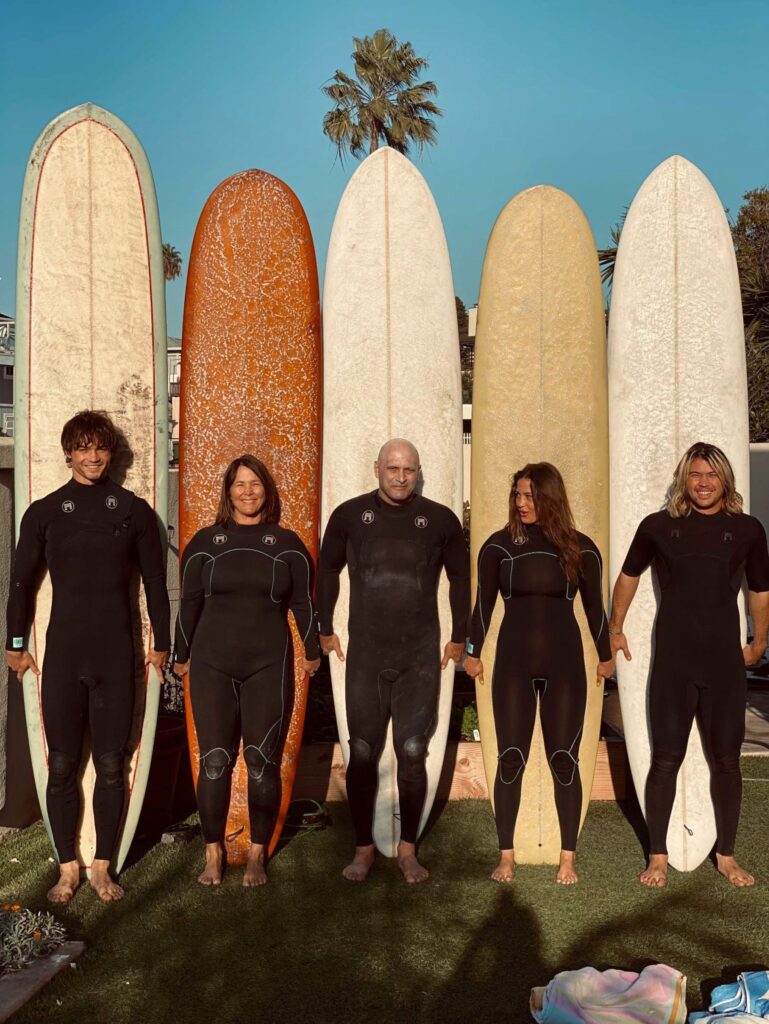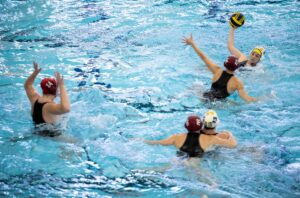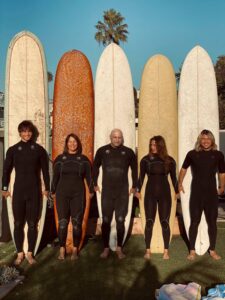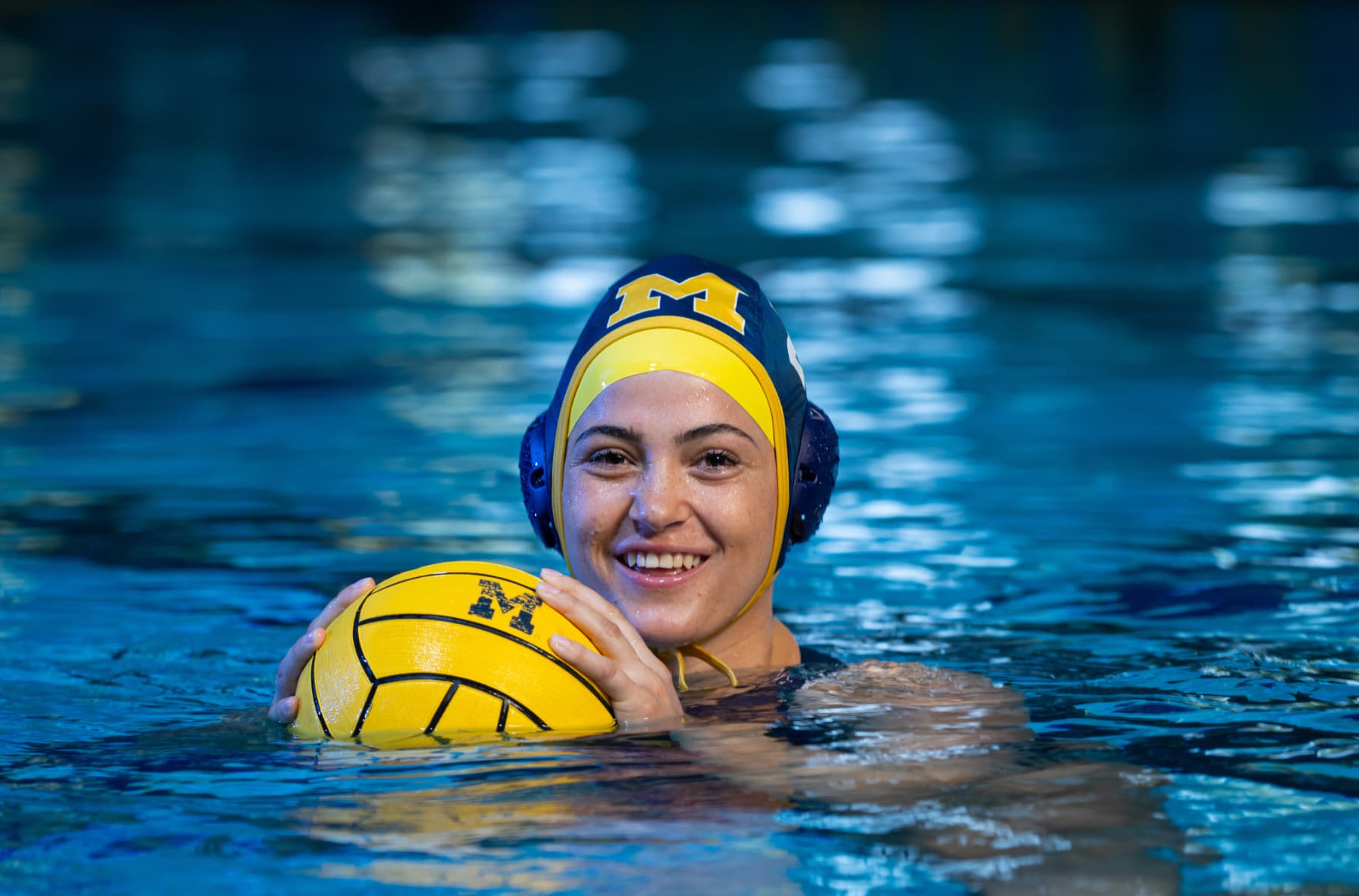By Lisa A. Goldstein
Lucana, the younger of the two, is a sophomore at the University of Michigan, where she is on the water polo team. Before college, she racked up many awards, including placing third in the National Junior Olympics.
Lucana’s hearing loss was diagnosed at birth. It was initially classified as progressive hearing loss in both ears. By the time she was 6 years old, she was profoundly deaf. At that time, she got a cochlear implant. She wears a hearing aid in her right ear but like her brother, is also considering a second implant.
Lucana has another challenge in that she is a Type 1 diabetic, which played a major role in the way she was raised. It also taught her how to deal with problems like playing water polo and having to keep track of all her devices.
 As a child, Lucana was always involved with water sports. When the family moved to California from Jackson Hole, Wyoming, she continued swimming and surfing as much as possible. Her oldest brother Simon began water polo in high school, a popular sport in California. His coach saw Lucana swimming one day when she was in fourth grade and asked her to join a practice. She was the only girl, but holding the ball and scoring felt so natural. The coach insisted she come back, and the rest is history.
As a child, Lucana was always involved with water sports. When the family moved to California from Jackson Hole, Wyoming, she continued swimming and surfing as much as possible. Her oldest brother Simon began water polo in high school, a popular sport in California. His coach saw Lucana swimming one day when she was in fourth grade and asked her to join a practice. She was the only girl, but holding the ball and scoring felt so natural. The coach insisted she come back, and the rest is history.
Having a deep passion for being in the water furthered Lucana’s love for water polo. Growing up with two older brothers who played hockey and soccer, she always had a more aggressive side. Water polo–considered one of the hardest sports–taps into that competitiveness, she said. “You are allowed to be creative and you have to be strong as you are swimming and battling against your opponent,” she said. “As I got older, I realized I could play at a high level and that encouraged me to work hard and be the best I could.”
Lucana’s team at the University of Michigan requires her to work 20 hours a week, which amounts to about three to four hours a day. They travel for competitions and even have to work on conditioning during the off-season.
Lucana has never encountered another water polo player who is deaf. Communicating with her teammates is the biggest challenge when it comes to being deaf and playing a water sport. It is a very fast-paced, aggressive game that involves a lot of moving parts. “It is necessary to be able to communicate constantly with your teammates,” Lucana said. Her ability to hear in the pool is limited. As she has gotten older, she has stepped into the role of becoming the most vocal person on the team so that everyone is listening to her. This reduces the amount that she has to listen to others as well. Her teammates also understand that to communicate with her effectively, they have to use her name, repeat several times, and be loud and direct.
 The team is currently preparing for their conference games in April which will have them competing against the best teams in the NCAA. Once she graduates, Lucana thinks she will be finished with water polo. “The USA women’s water polo team is one of the best in the world, and it would be very difficult to qualify for that team,” she said. “I may find that I miss it and play masters (competitive water polo for people 18+).”
The team is currently preparing for their conference games in April which will have them competing against the best teams in the NCAA. Once she graduates, Lucana thinks she will be finished with water polo. “The USA women’s water polo team is one of the best in the world, and it would be very difficult to qualify for that team,” she said. “I may find that I miss it and play masters (competitive water polo for people 18+).”
Lucana is enrolled in the university’s School of Kinesiology, majoring in Applied Exercise Science, studying the biomechanics of the human body and how it adapts to exercise. She hopes to eventually work with a professional sports team as an athletic trainer or do something requiring emergency medical response.
When not competing or studying, Lucana loves hanging out with her friends, surfing, catching some sun at the beach, or making good food and traveling with her family.
“I am incredibly grateful to be in a generation that has wonderful technology and be able to use it to its full potential,” she said.
Tierra y Agua: la historia de Lucana
Por Lisa A. Goldstein
Theo y Lucana Hirschfield son dos talentosos hermanos que tienen sordera. Esta es la historia de Lucana.
Lucana estudia segundo curso en la University of Michigan, donde forma parte del equipo de waterpolo. Antes de ir a la universidad, ya acumulaba numerosos premios, entre ellos el tercer puesto en los Juegos Olímpicos Nacionales Juveniles.
La pérdida auditiva de Lucana fue diagnosticada al nacer. Inicialmente se clasificó como una pérdida auditiva progresiva en ambos oídos y, a los 6 años, ya tenía una sordera profunda, por lo que le pusieron un implante coclear. Lleva un audífono en el oído derecho, pero, al igual que su hermano, también se está planteando un segundo implante.
Lucana tiene otro reto: es diabética de tipo 1, lo que influyó mucho en su crianza. También le enseñó a enfrentarse a problemas como jugar al waterpolo y tener que estar pendiente de todos sus aparatos.
 De niña, Lucana siempre practicaba deportes acuáticos. Cuando la familia se trasladó a California desde Jackson Hole (Wyoming), siguió nadando y haciendo surf todo lo posible. Su hermano mayor, Simon, empezó a jugar al waterpolo en el instituto, un deporte muy popular en California. Su entrenador vio nadar a Lucana un día, cuando la niña estaba en cuarto curso, y le invitó a que se apuntara a un entrenamiento. Era la única chica, pero sostenía el balón y marcaba con gran facilidad. El entrenador insistió en que volviera y el resto es historia.
De niña, Lucana siempre practicaba deportes acuáticos. Cuando la familia se trasladó a California desde Jackson Hole (Wyoming), siguió nadando y haciendo surf todo lo posible. Su hermano mayor, Simon, empezó a jugar al waterpolo en el instituto, un deporte muy popular en California. Su entrenador vio nadar a Lucana un día, cuando la niña estaba en cuarto curso, y le invitó a que se apuntara a un entrenamiento. Era la única chica, pero sostenía el balón y marcaba con gran facilidad. El entrenador insistió en que volviera y el resto es historia.
Su gran pasión por el agua fomentó su entusiasmo por el waterpolo. Al crecer con dos hermanos mayores que jugaban al hockey y al fútbol pudo desarrollar una faceta más combativa. En el waterpolo, considerado uno de los deportes más duros, se aprovecha esta competitividad, afirma. «Se te permite ser creativa y tienes que ser fuerte mientras nadas y luchas contra tu oponente», explica. «A medida que fui creciendo, me di cuenta de que podía jugar a un nivel alto, lo que me animó a esforzarme y a tratar de hacerlo lo mejor posible».
El equipo de Lucana en la University of Michigan le exige entrenar 20 horas a la semana, lo que equivale a unas tres o cuatro horas diarias. Deben viajar para participar en competiciones e incluso tienen que trabajar la preparación física fuera de temporada.
Lucana nunca se ha encontrado a ninguna otra jugadora de waterpolo que tenga sordera. Comunicarte con tus compañeras de equipo es el mayor reto si tienes sordera y practicas un deporte acuático. Es un juego muy rápido y combativo en el que intervienen muchas partes móviles. «Es necesario poder comunicarte constantemente con las compañeras», asegura Lucana. Su capacidad para oír en la piscina es limitada. A medida que ha ido creciendo, se ha convertido en el miembro del equipo que habla más alto para que todos la escuchen. Por otra parte, también se enfrenta a una escucha reducida. Sus compañeras también entienden que, para comunicarse con ella de una manera eficaz, tienen que decir su nombre, repetirlo varias veces, y hablarle de forma clara y directa.
 El equipo se prepara actualmente para los partidos de «conferencia» que se celebrarán en abril, en los que competirá contra los mejores equipos de la NCAA. Una vez que se gradúe, Lucana cree que dejará de jugar al waterpolo. «El equipo femenino de waterpolo estadounidense es uno de los mejores del mundo y sería muy difícil clasificarse para participar en el equipo», añade. «Puede que me dé cuenta de que lo extraño y juegue másters (waterpolo de competición para mayores de 18 años)».
El equipo se prepara actualmente para los partidos de «conferencia» que se celebrarán en abril, en los que competirá contra los mejores equipos de la NCAA. Una vez que se gradúe, Lucana cree que dejará de jugar al waterpolo. «El equipo femenino de waterpolo estadounidense es uno de los mejores del mundo y sería muy difícil clasificarse para participar en el equipo», añade. «Puede que me dé cuenta de que lo extraño y juegue másters (waterpolo de competición para mayores de 18 años)».
Lucana está matriculada en la Facultad de Kinesiología de la universidad, especializándose en Ciencias Aplicadas del Ejercicio, y estudia la biomecánica del cuerpo humano y cómo se adapta al ejercicio. Espera llegar a trabajar con un equipo deportivo profesional como entrenadora de atletismo o dedicarse a algo que requiera una respuesta médica de emergencia.
Cuando no compite o estudia, a Lucana le encanta salir con sus amigas, hacer surf, tomar el sol en la playa o preparar una buena comida y viajar con su familia.
«Me siento increíblemente agradecida de pertenecer a una generación que dispone de una tecnología extraordinaria y de poder utilizarla en todo su potencial», concluye.

